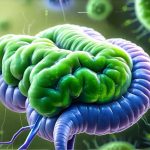Our digestive system is often an afterthought, something we only truly notice when it’s not functioning optimally. Yet, it’s the engine that drives so much of our overall wellbeing – impacting everything from nutrient absorption and immune function to mood and energy levels. A healthy gut isn’t simply about avoiding bloating or discomfort; it’s about laying a foundational bedrock for long-term vitality. Many people believe digestive issues are just ‘part of getting older,’ or something to be tolerated, but proactive daily habits can significantly improve – and often transform – your gut health and quality of life.
The good news is that cultivating a happier gut doesn’t require drastic changes or expensive supplements. It’s about integrating small, consistent practices into your everyday routine, focusing on nourishing your microbiome, supporting healthy digestion, and listening to your body’s signals. These habits aren’t about restriction; they are about abundance – providing your digestive system with the tools it needs to thrive, rather than constantly battling against imbalances. This article will explore practical, actionable steps you can take today to build a foundation for long-term digestive ease and overall health.
The Foundation: Diet & Hydration
What we eat (and drink) forms the very core of our gut health. It’s not just about avoiding ‘bad’ foods; it’s about consciously incorporating more of what supports a thriving ecosystem within your digestive tract. A diverse diet rich in whole, unprocessed foods is paramount. Think vibrant fruits and vegetables, lean proteins, healthy fats, and – crucially – fiber. Fiber isn’t just for regularity; it acts as food for the beneficial bacteria in your gut, promoting their growth and diversity. Different types of fiber feed different bacterial strains, so variety is key.
Hydration plays an equally vital role. Water is essential for moving food through the digestive system, preventing constipation, and supporting nutrient absorption. Often, we mistake thirst for hunger, leading to overeating or choosing less-than-ideal snacks. Aiming for at least eight glasses of water a day – adjusting based on your activity level and climate – is a great starting point. Herbal teas can also contribute to hydration and offer additional benefits. Consider incorporating options like ginger or peppermint tea which are traditionally known to aid digestion.
Beyond simply what we consume, how we consume it matters too. Mindful eating—paying attention to hunger cues, savoring each bite, and avoiding distractions—allows your digestive system to work more efficiently. Eating quickly or while stressed can impair digestion, leading to discomfort and bloating. Taking the time to truly enjoy your meals allows for proper chewing (the first step in digestion!) and signals to your body that it’s receiving nourishment.
Cultivating a Fiber-Rich Diet
Fiber is arguably the unsung hero of gut health. But understanding the different types can help you maximize its benefits:
– Soluble fiber dissolves in water, forming a gel-like substance that slows digestion and helps regulate blood sugar levels. Sources include oats, beans, apples, and citrus fruits.
– Insoluble fiber doesn’t dissolve in water; it adds bulk to stool and promotes regularity. Found in whole grains, vegetables, and wheat bran.
Gradually increasing your fiber intake is vital to avoid discomfort. A sudden surge can lead to bloating and gas. Start by adding one or two servings of high-fiber foods each day and gradually increase from there. Listen to your body and adjust accordingly. Consider these steps:
1. Swap refined grains for whole grains (brown rice, quinoa, whole wheat bread).
2. Add a side of vegetables to every meal.
3. Include legumes (beans, lentils) in your diet at least twice a week.
4. Snack on fruits with edible peels (apples, pears).
The Role of Fermented Foods
Fermented foods are naturally rich in probiotics – live microorganisms that can benefit gut health. These beneficial bacteria help to diversify the microbiome and improve digestion. Traditional fermentation processes also often enhance nutrient availability. Think beyond yogurt (although good quality, unsweetened yogurt is a great option!). Kimchi, sauerkraut, kefir, kombucha, miso, and tempeh are all excellent sources of probiotics.
Introducing fermented foods gradually is recommended, as some individuals may experience temporary digestive upset as their gut microbiome adjusts. Start with small portions and observe how your body responds. It’s also important to choose unpasteurized versions when possible, as pasteurization kills the beneficial bacteria. Remember that probiotic supplements are not a substitute for whole food sources; they often contain fewer strains of bacteria and lack the other nutrients found in fermented foods.
Hydration Strategies Beyond Water
While water is essential, staying adequately hydrated can sometimes feel like a challenge. Here are some strategies to incorporate more fluids into your day:
– Infuse water with fruits or herbs (cucumber, lemon, mint).
– Drink herbal teas throughout the day.
– Consume water-rich foods like watermelon, cucumbers, and celery.
– Set reminders on your phone to drink water regularly.
– Carry a reusable water bottle as a visual cue to stay hydrated.
Prioritizing hydration isn’t just about quenching thirst; it’s an investment in optimal digestive function. Dehydration can lead to constipation, impaired nutrient absorption, and overall discomfort.
Lifestyle Factors & Digestive Support
Beyond diet and hydration, several lifestyle factors significantly impact gut health. Stress management is paramount. Chronic stress disrupts the delicate balance of the gut microbiome and can contribute to a range of digestive issues. Finding healthy ways to manage stress—whether through exercise, meditation, yoga, or spending time in nature—is crucial for long-term digestive wellbeing. Regular physical activity also plays a key role. Exercise helps stimulate intestinal motility (the movement of food through the digestive tract), reducing constipation and promoting regularity.
Sleep is another often overlooked factor. Adequate sleep allows your body to repair and restore itself, including your digestive system. Aiming for seven to nine hours of quality sleep each night is essential. Finally, mindful movement—paying attention to how your body feels during exercise—can promote a stronger connection between mind and body, enhancing overall wellbeing. A holistic approach that addresses all aspects of lifestyle is far more effective than focusing solely on diet. It’s important to recognize how minor stress can affect your gut health.
It’s also vital to be aware of potential gut disruptors. These can include things like excessive alcohol consumption, smoking, and the overuse of antibiotics (which can kill both good and bad bacteria). Minimizing exposure to these factors will help protect your gut microbiome. You might find it useful to review weekend habits that could be contributing to digestive issues.
This article offers a starting point for cultivating long-term digestive ease. Remember that everyone is different, and what works for one person may not work for another. The key is to experiment, listen to your body, and find habits that fit seamlessly into your lifestyle. Building a healthier gut isn’t about perfection; it’s about progress, consistency, and prioritizing your overall wellbeing. For those with sensitive stomachs, exploring the best daily routine can be exceptionally helpful.


















